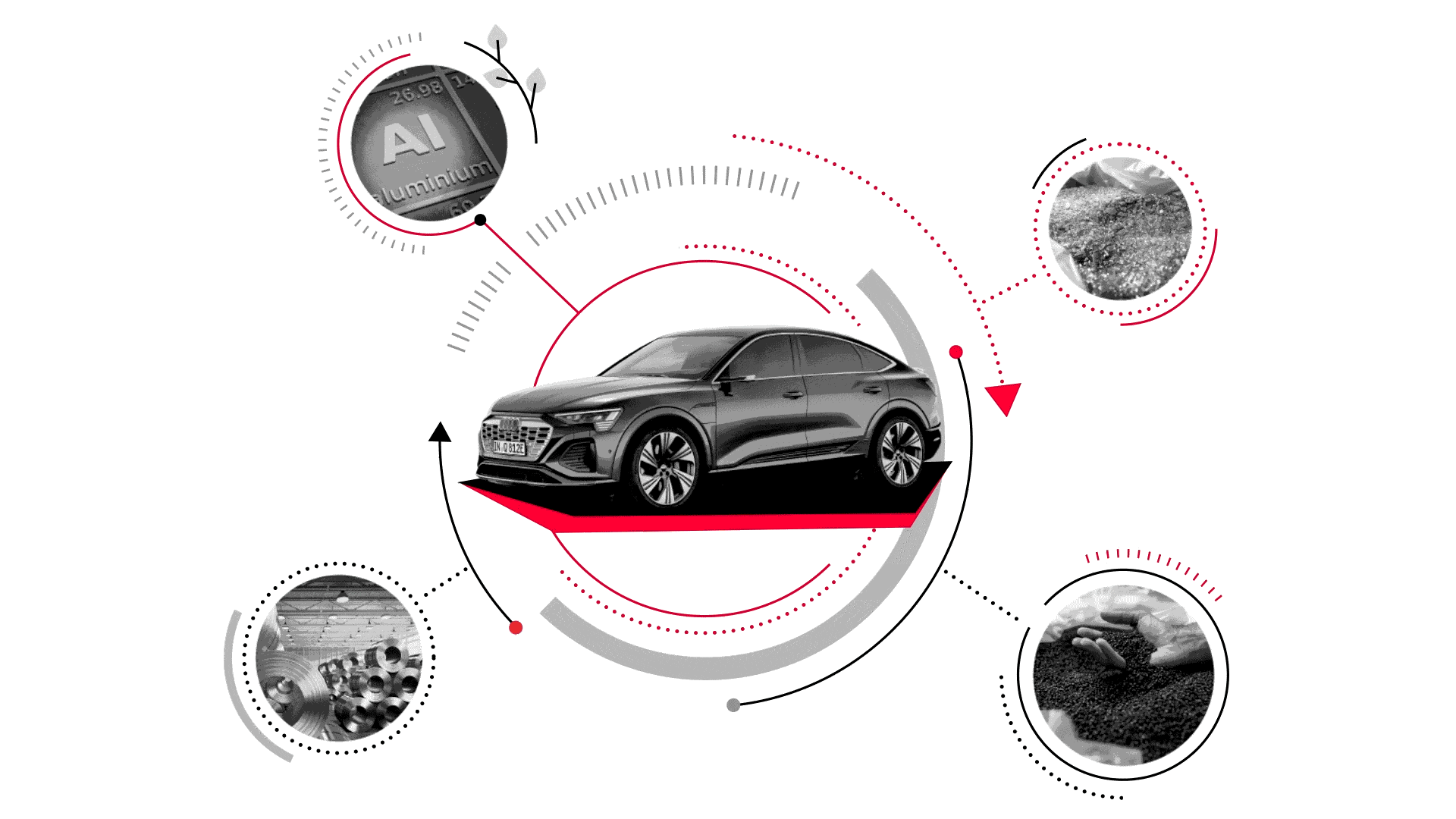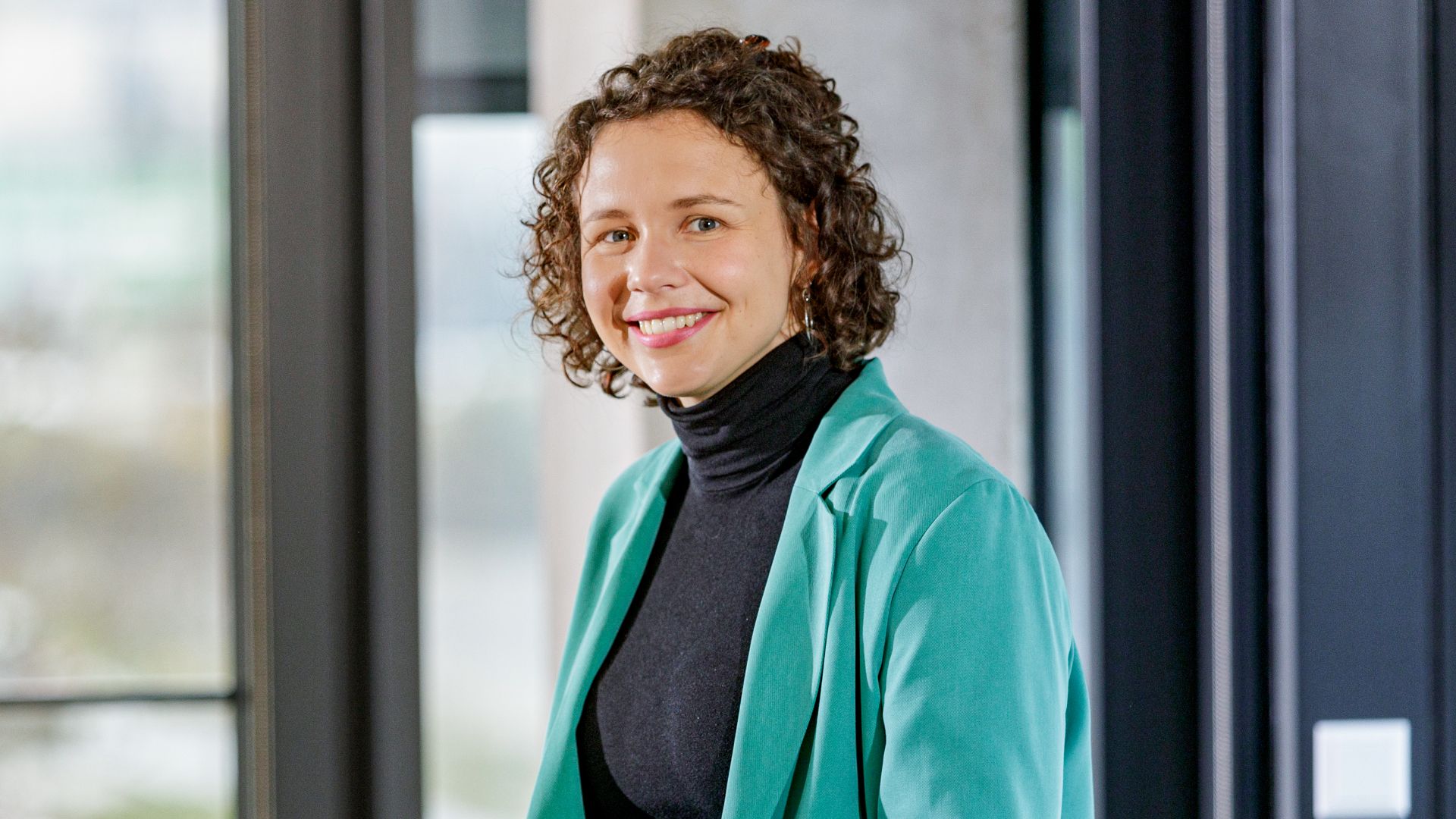Powering transformation from within
missing translation: fa.article-intro.reading-time – 08/04/2025
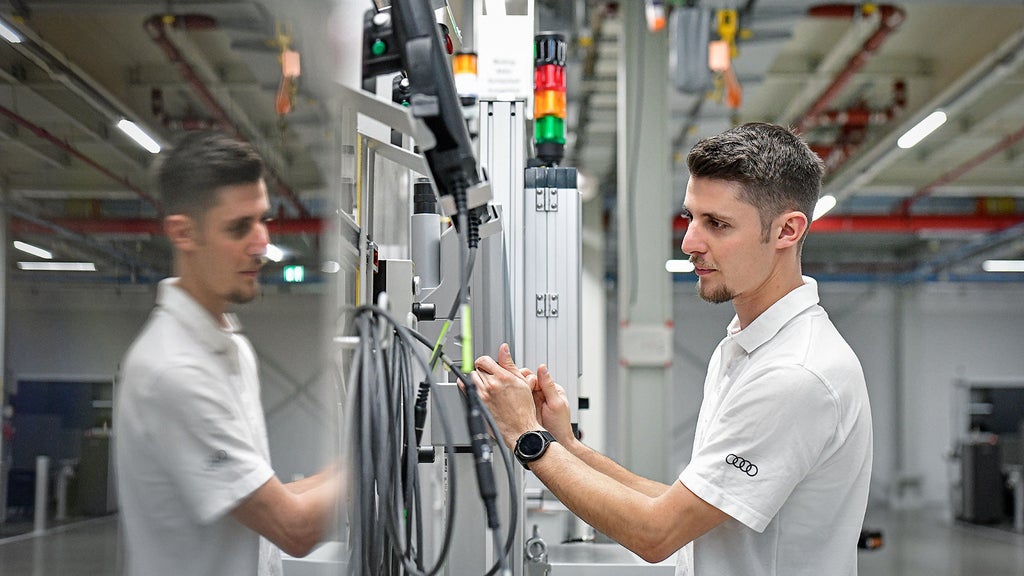
Daniel Mayer, process optimizer, Ingolstadt, AUDI AG
Daniel Mayer, process optimizer, Ingolstadt, AUDI AG
Employees from all divisions – from Development to Procurement through to Production – strive every day to ensure the successful transformation to electric mobility. Not only does this involve challenges, it also offers opportunities. To take advantage of these, Audi has developed intensive training and development programs to optimally prepare its workforce and is thus counteracting the shortage of skilled labor simultaneously. A glance at the career progression of process optimizer Daniel Mayer and the establishment of the battery assembly facility in Ingolstadt shows how well this is working.
In the Ingolstadt factory hall, myriads of orange-colored robot arms operate in six line sections to assemble the high-voltage batteries for Audi electric vehicles based on the Premium Platform Electric (PPE). “The assembly is highly complex technically, but actually quite easy to explain. There’s a tray including cooling system in which we mount the high-voltage battery system with its individual modules and connections onto a heat dissipation paste. We then glue-down the lid and install a control unit as the interface to the vehicle. And before the battery is then finally ready, there are a number of safety tests to carry out,” explains Daniel Mayer.
Driving innovation through initiative
The qualified electromechanical engineer began his career at Audi as a production specialist in pre-assembly for the rear axle of the Audi A5. This is an area with established processes and a wealth of experience. With the electrification of mobility, however, not only are the vehicles changing, but also proven production processes. Daniel Mayer was quick to recognize that this would open up new professional opportunities: “The future of mobility is electric: I therefore decided to take a sabbatical in 2018 and completed my training as a master electrician during that time.”
He wanted to apply his newly acquired skills to the electrification of Audi and seized the opportunity in 2020. As part of a basic unit with around 20 Audi employees, he familiarized himself with the subject so that he could play his part in developing the new battery assembly facility in Ingolstadt. Two years later, Daniel Mayer was responsible for two assembly line sections. In 2024, he became group spokesperson and advanced to process optimizer a year later. "I'm familiar with the work steps involved in battery assembly from my work as a plant operator. This knowledge helps me, now as a process optimizer, together with my colleagues in production and quality assurance, to ensure the high quality and durability standards of our components.
“That was real pioneering work.
Daniel Mayer, process optimizer, Ingolstadt, AUDI AG
He learned about the special requirements of manufacturing high-voltage batteries during the course of various training programs, including at the Audi Akademie. He acquired technical and theoretical knowledge, such as safety rules for working with high voltage, off the job in courses and lectures. “But on-the-job learning was more to my liking,” laughs Daniel Mayer. For this, he enjoyed lively exchanges with experts at the battery competence center in Neckarsulm and the battery testing center in Gaimersheim. From foundational research on battery cells to development of prototypes and new manufacturing technology through to service life test rigs and prototype assembly of high-voltage rechargeable batteries – the experts are the source of electrical expertise at Audi and share their knowledge in the Group.
No future without vision
Up to 1,050 batteries for the Audi Q6 e-tron and the Audi A6 e-tron family can be assembled daily in Ingolstadt. Some technologies at the plant are being used for the first time at Audi. Applying them in series production was an exciting process. Or, as Daniel Mayer puts it: “That was real pioneering work.”
Today, around 300 employees work in battery assembly in Ingolstadt. To build this workforce, the company is specifically recruiting individuals within its own ranks who will then be specifically qualified for battery assembly. Interest in these promising jobs has been and continues to be high.
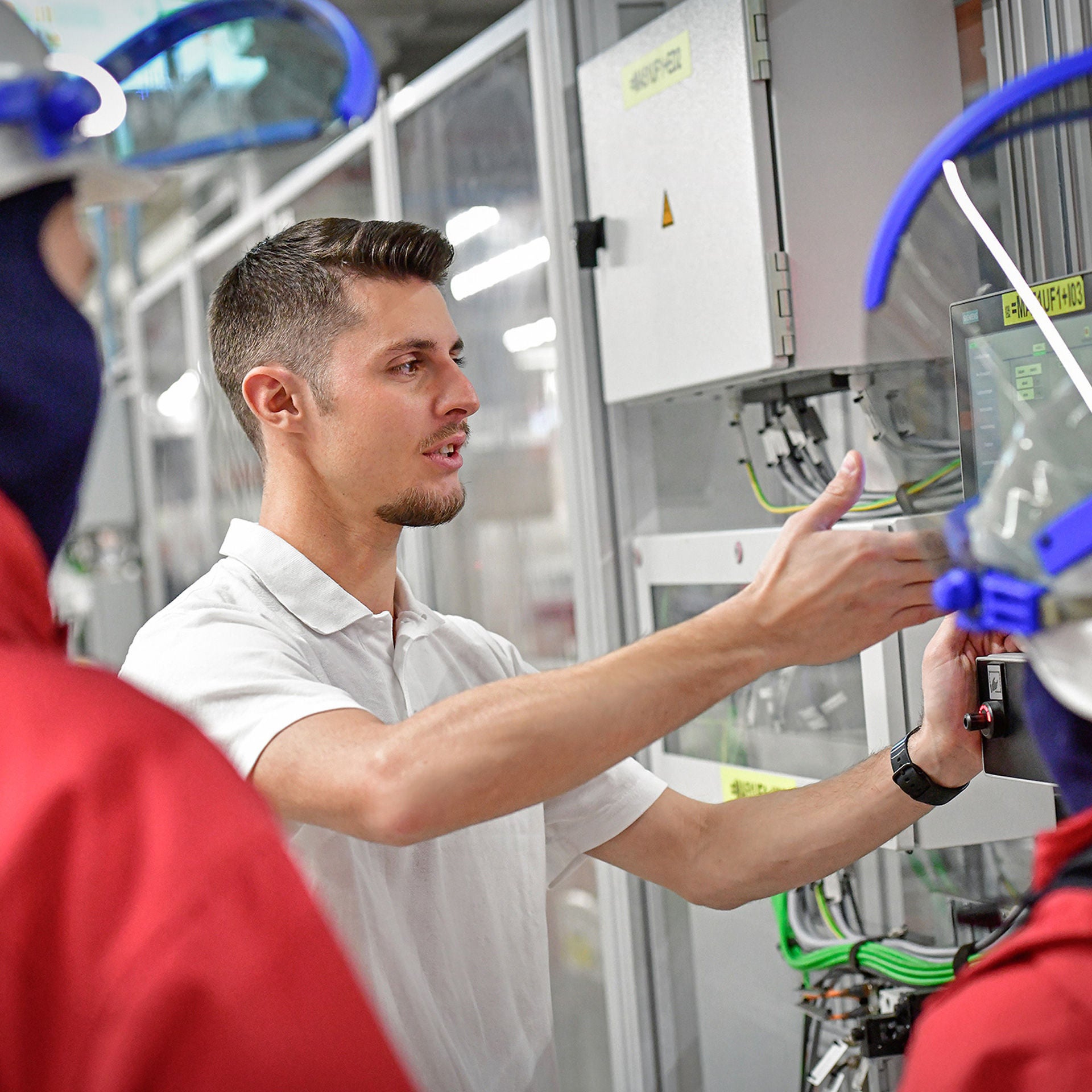
Training at Audi
More details
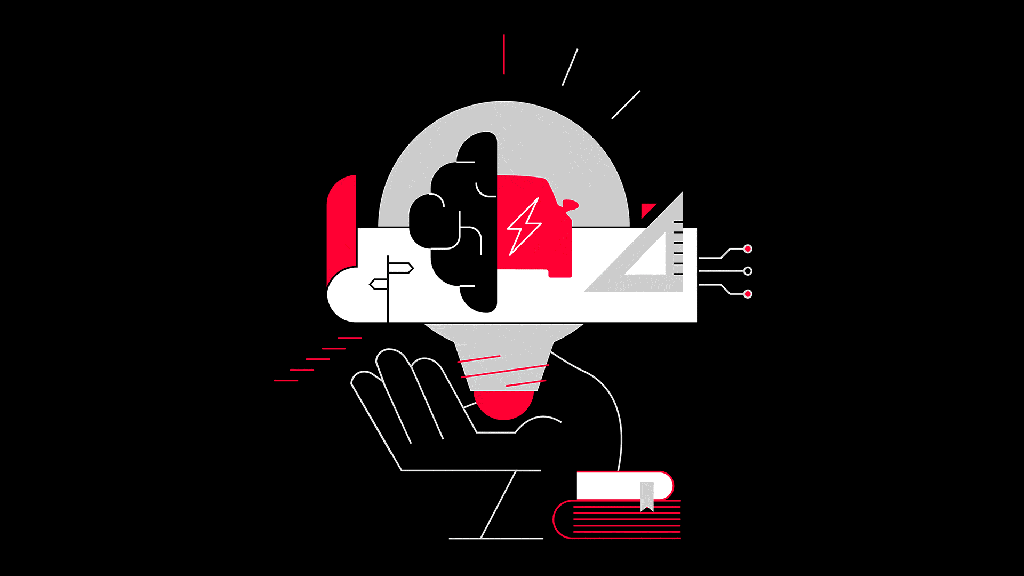
Developing and nurturing competences: the transformation calls for new key skills. The Audi Akademie pools all training activities at Audi – from vocational training to advanced training and competence development – and thus helps to secure Audi’s competence lead in collaboration with the various departments.
Training hours with a focus on energy-systems/e-mobility
Transformation-related training hours
training hours overall
AUDI AG, figures refer to Year 2024
Together for innovation
Experts from the area of battery production, the Audi Akademie, the battery testing center in Gaimersheim and the battery competence center in Neckarsulm worked closely together to develop tailor-made training paths for employees like Daniel Mayer. Since 2021, a total of 1,400 employees have been trained, further educated or retrained for the production of the Audi Q6 e-tron and the Audi A6 e-tron family.
“This is a rolling process. We continue to refine our training paths in order to continually improve our efficiency and adapt them to changing requirements on an ongoing basis,” explains Benedikt Meier, who acts as the interface between production and the Audi Akademie in his role as coordinator and responsible qualified electrician.
In addition to a range of different development and retraining measures, Audi is also expanding its electric expertise within the Group continually with cutting-edge apprenticeship vocations and work-study degree programs. These include, for example, work-study degree programs in electrical and information engineering as well as apprenticeships as an automotive mechatronics technician specializing in systems engineering and high-voltage technology or an IT specialist for application development.
A bright future together
Making a vehicle manufacturer that focuses on combustion engines fit for e-mobility in just a few years is a major undertaking. Technically, structurally and culturally. Tamara Staniszewski knows that only too well. She is a training consultant and expert in preparing Audi employees to take on higher-level or different tasks. “People who already work for us are extremely valuable – they know our systems, our processes, our culture,” she says. This eliminates the need for extensive induction training and means that we can make time savings of a good six months per capita compared with hiring an external skilled employee. Together with Strategic HR Planning, she knows precisely which job clusters need to be transformed in the course of electrification in order to address the needs of the employees from these areas.
“Helping to set up the first Audi battery production facility in Germany – being part of it – that is an experience I will never forget.
Daniel Mayer, process optimizer, Ingolstadt, AUDI AG
A culture of open dialog in the company and the motivation of the Audi employees are what make electrification in the Group possible. “Helping to set up the first Audi battery production facility in Germany – being part of it – that is an experience I will never forget,” sums up Daniel Mayer.
The transformation of the automotive industry brings enormous challenges – but likewise major opportunities for the future. Audi is actively helping to shape this change. Equipped with decades of experience and strengthened by highly motivated and strategically trained employees, the Group is going to make the switch to electric mobility.

